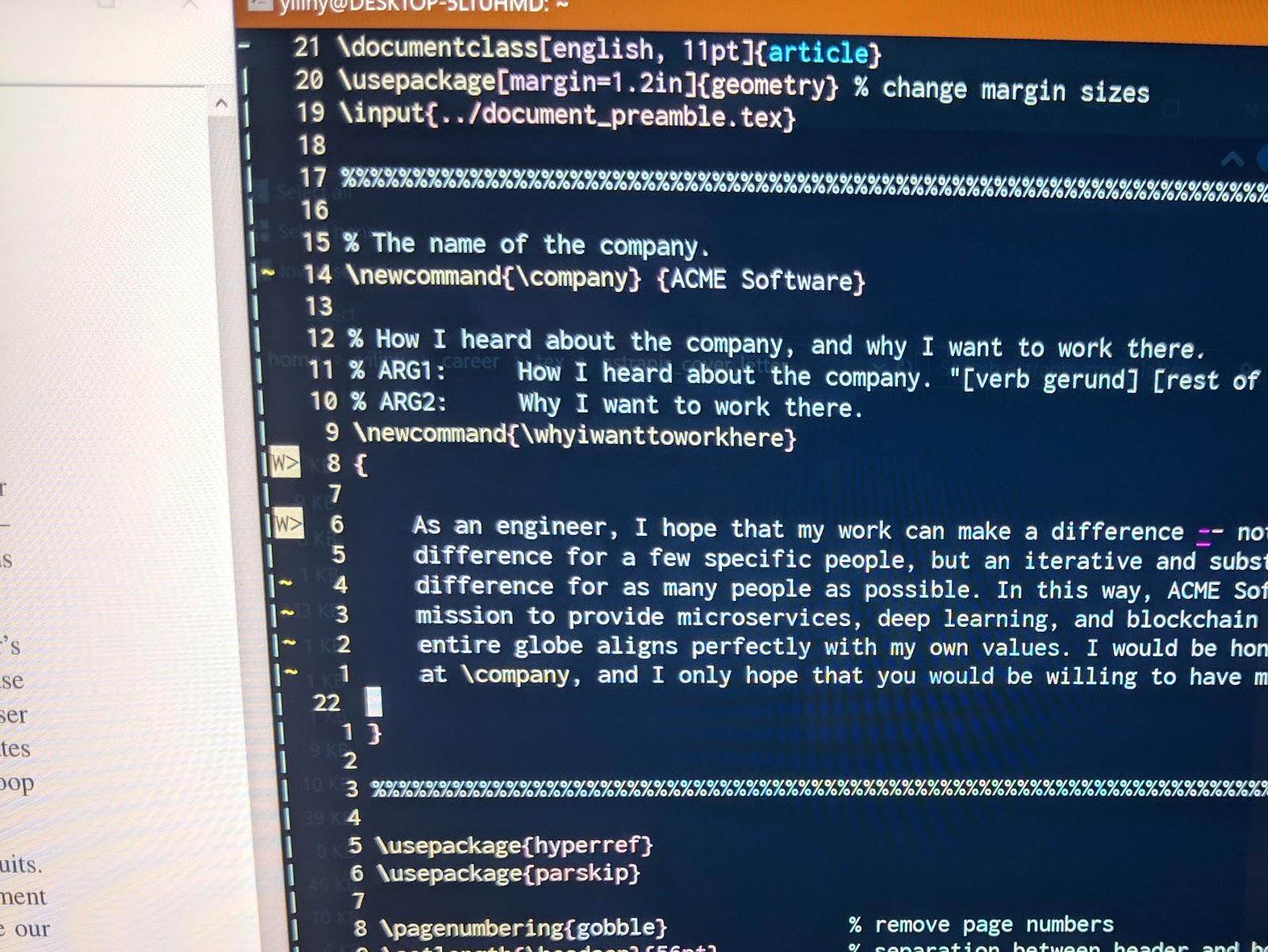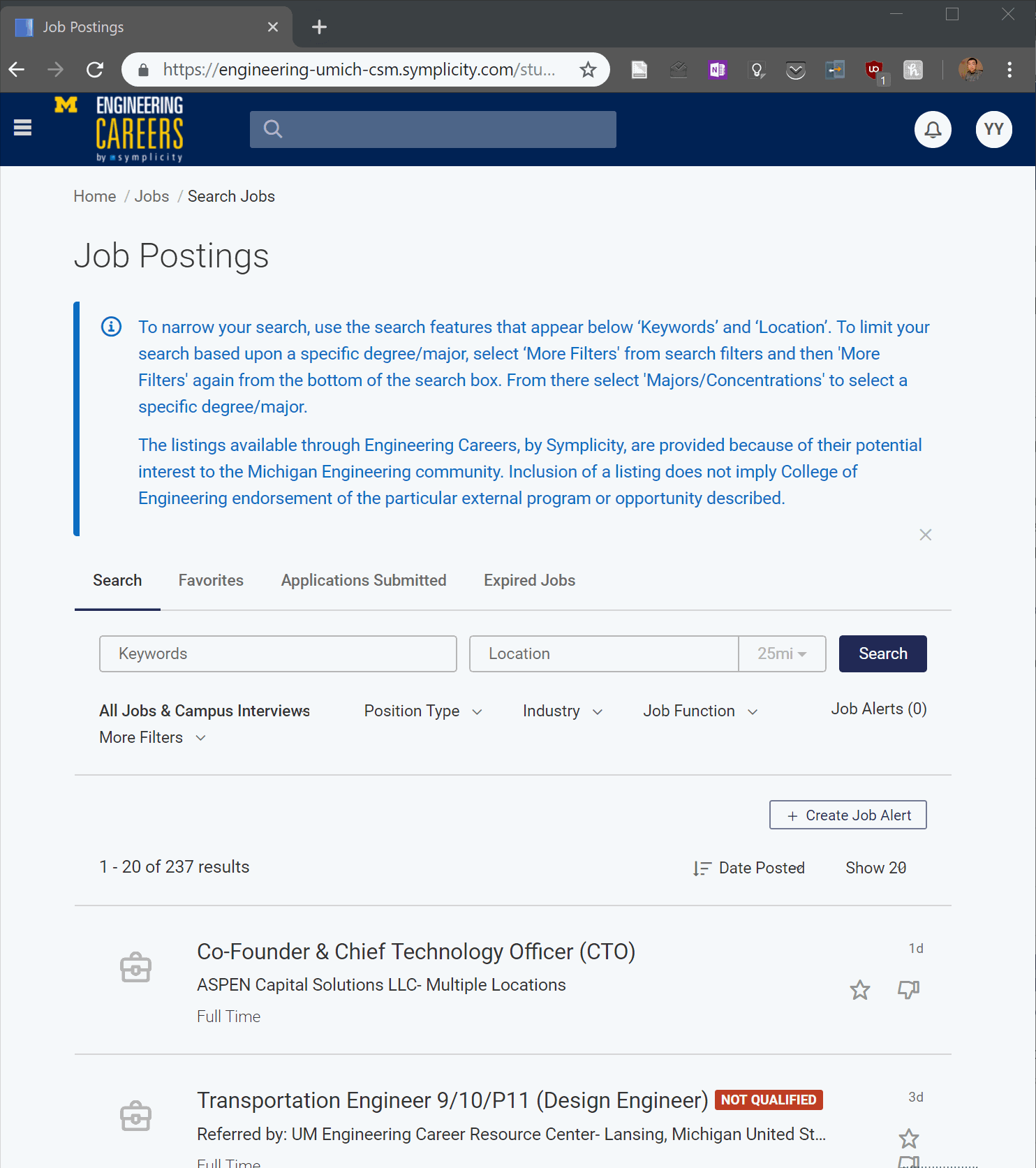Blog
Get the inside scoop about life at U-M and applying to Michigan from current student bloggers, Admissions staff, and guest faculty writers.

Get the inside scoop about life at U-M and applying to Michigan from current student bloggers, Admissions staff, and guest faculty writers.


The process of finding a summer internship can be frustrating; having work experience is important to post-grad employment—arguably essential in some fields—but the rules that govern its acquisition are nebulous and terribly buzzwordy.
For those of you finishing your senior years of high school—if you can feel the stress of your coursework starting to give way, not to freedom, but to the existential dread of Adult Responsibility and the Post-Graduation Job Search—fear not! Having spent a few years flopping through the job market like soggy toast, I come bearing Hard-Won Advice to help allay your fears!
Befriend ("network with") other students in your field of study
Like an honor society – or a professional fraternity, or a Michigan Learning Community, or some other group in which you're surrounded by students who share your major or desired career – it helps immensely to have that sort of professional support network. Searching for internships can be demoralizing, and oftentimes deeply humiliating. During my first career fair my sophomore year, for instance, I'd made a great impression on a company recruiter; they got as far as quizzing me on my technical background, at which point my brain rebooted for a Windows Update and forgot that "Gaussian distribution" means “bell curve.”
You'd be surprised at just how disdainfully a company rep can dismiss you with the words: "Be sure to apply online." However, your network will help make you feel less terrible about instances like this. They'll also encourage you to keep trying, which is essential to landing a job or internship.
You'd be surprised at just how disdainfully a company rep can dismiss you with the words: "Be sure to apply online." Speaking from direct personal experience, having a sympathetic ear to which you can vent helps to make events like this more bearable.
When applying online, quantity beats quality

This is the early phase of the application process that I like to describe as the "resumé firehose." Competition for online job postings tends to be fierce; success in getting those postings often comes down to chance. Employers receive so many applications that, in all likelihood, the flood of candidates will bury even the most lovingly crafted statements of intent.
As an extension to this:
In particular, don't write cover letters
Unless you're forced to, i.e. if the position to which you're applying requires that you attach a cover letter before you can click "submit," having a "generic" cover letter into which you copy-paste the name of the company is helpful.
This is most applicable to "high-volume" job/internship postings: for these, odds are low that a human will even read your resumé, let alone a full-page cover letter. For other positions, however, having a cover letter definitely matters more. (I did write a cover letter when I applied to become a U-M Admissions blogger, for instance.) Use your best judgment!
Meet with recruiters face-to-face
The University of Michigan is a target school for many firms across many different fields of study. It hosts large job fairs for students in fields ranging from consulting and finance to education to actuarial science. This is especially striking for engineers, who enjoy a gargantuan career fair every Fall term that offers a cornucopia of internship opportunities at the expense of rendering North Campus basically impassable to pedestrian foot traffic for two full days.
Large companies regularly host events on campus (company days, "tech talks", etc.); while these might nominally serve to promote the company, their actual purpose is to put potential hires face-to-face with company reps. Making a good impression on a recruiter face-to-face is a great way to bypass the Resumé Battle Royale of applying online, which can be a fruitful strategy if you play your cards right. And even if you botch things spectacularly, as I did during my first career fair, it’s just one company, not the end of the world.
Don't get discouraged
I may have mentioned this earlier, but it bears repeating: the internship search is a crapshoot at the best of times, often on a scale or magnitude worse than college applications. Michigan receives more than 65,000 applicants per year: Google receives over three million.
I've sent internship applications to 33 companies this year: out of those, four invited me to complete online coding challenges, three invited me to interviews, and two made me an offer. I consider myself an attractive candidate to employers, but even I was startled at how hard they Dunked on me. I spent a full week completing a coding challenge for GitHub, only to receive a rejection email less than twelve hours after my final submission.
If your efforts are initially met with a Whole Lotta Nothing, don't let it get you down. As always, your self-worth isn't determined by the prestige of the institutions that accept you.

(rhymes with "Dylan") is a senior in the College of Engineering. Though free-spirited and soulful in his youth, Yilin was doomed to major in computer science after being kidnapped by feral app developers and raised in the Michigan wilderness. Outside of his coursework, Yilin works as an Instructional Aide for EECS 482: "Intro Operating Systems", writes plugins for obscure open-source text editors, and injures himself grievously while riding Bird scooters.